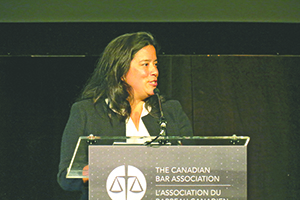 The federal government has introduced legislation to purge the Criminal Code of obsolete provisions and enhance sexual assault law.
The federal government has introduced legislation to purge the Criminal Code of obsolete provisions and enhance sexual assault law.Minister of Justice Jody Wilson-Raybould announced the proposed changes Tuesday as part of an effort to modernize the country’s criminal laws to bring them more in line with the Charter.
“This proposed legislation is another milestone in our ongoing efforts to make our criminal laws fairer, clearer, more relevant, accessible and compassionate,” Wilson-Raybould said.
The legislation builds on a bill introduced in March and looks to amend or repeal a number of provisions in the Criminal Code the government has determined are out of date or likely unconstitutional. The 26-page bill also looks to clarify sexual assault provisions as they relate to consent and the admissibility of evidence.
The “zombie law” provisions that will be axed for being obsolete or redundant include sections concerning challenging someone to a duel, fraudulently pretending to practise witchcraft and blasphemous libel.
The amendments to sexual assault provisions will clarify that an unconscious person is incapable of consent. Under the proposed legislation, “rape shield” provisions that prohibit a complainant’s past sexual history from being used to try to discredit them, would also be expanded to include communications of sexual nature or a sexual purpose.
The changes would include the creation of a “regime” that would determine if an accused can introduce a complainant’s private records at trial. It would also provide that complainants have the right to legal representation in rape shield proceedings.
Wilson-Raybould said these reforms, if passed, would be the first major changes to sexual assault laws since rape shield provisions were introduced 25 years ago.
“I am hopeful that the proposed changes to the sexual assault provisions will go a long way towards ensuring that complainants are treated with the compassion, dignity and respect they deserve,” Wilson-Raybould said.
“Measures proposed in this legislation would also provide Canadians with greater assurances that their Charter rights are being respected and would promote greater understanding of how government legislation may engage our Charter rights and freedoms.”
The legislation would also require the government to table a Charter statement for every new bill introduced in Parliament in an attempt to help the public understand how legislation may affect their rights.
Wilson-Raybould said the proposed changes would also codify existing Supreme Court of Canada decisions that have determined existing provisions in the Criminal Code are unconstitutional.







